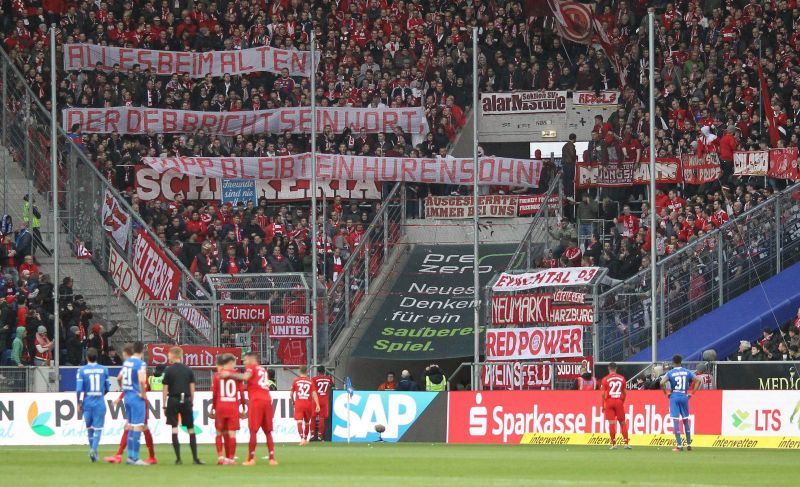
The response to the anti-Hopp banners highlights more systemic problems in German football - here's why
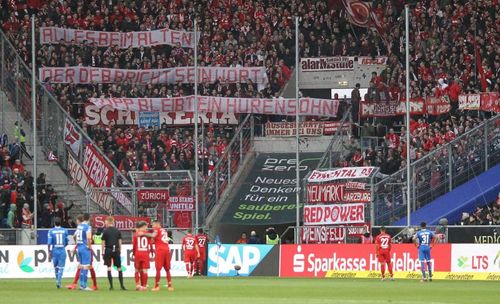
On Saturday evening, as Bayern Munich made the trip north-west to take on TSG Hoffenheim in the 24th round of Bundesliga, most players and fans would have expected a game to pass without any great incident. As it turned out, however, a thumping 6-0 win for the away side was not the biggest story of the day.
The extraordinary situation, in a nutshell, was this; After Bayern fans unfurled banners insulting Hoffenheim president Dietmar Hopp, several players and coaching staff, including manager Hansi Flick confronted the travelling support, asking them to take the banners down. However, the fans refused and the game was halted three times before the teams finally resumed the game, but instead of competing, simply knocked the ball around in the centre circle until time expired (For more details on the protest and the reason behind it, click here).
The two sides of the argument
Now, the protests against Hopp are nothing new. In fact, ever since he obtained a majority share in Hoffenheim in 2015, fans of several clubs in the Bundesliga have voiced their concerns about the fact that this could lead to wealthy businessmen circumventing the 50+1 rule and the league turning into a money-spinning machine rather than the excellent representation of German culture it is today.
In particular, Borussia Dortmund fans, who displayed a large banner in May 2019, depicting Hopp's face in the crosshairs of a gun, felt the full force of the German football federation, the DFB, as it decreed that Dortmund fans would not be allowed to visit Hoffenheim for the next two seasons, despite promising in 2017 that it would not be handing out collective punishments anymore.
In addition, Hopp himself took legal action against five Dortmund fans who had been identified as singing offensive chants, the exact language used by the Bayern fans on Saturday.
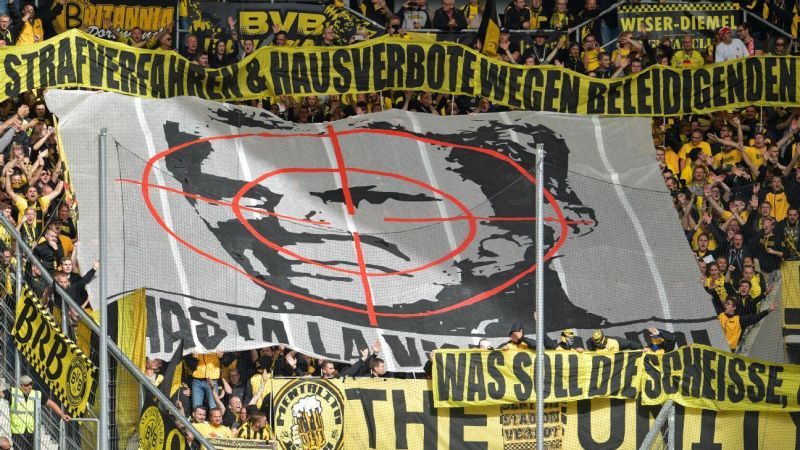
It must be said, at this juncture, that Hopp himself is perhaps being unfairly criticized-and rather harshly, some would add. After all, as a Hoffenheim native himself, would he not want to do all he can to see his hometown club scale new heights? The 50+1 rule states that investors who have been bankrolling a club for 20 years or more are allowed to purchase majority stakes and Hopp has simply taken up this option as he has been investing in Hoffenheim since 1989.
However, to say he is completely blameless in this scenario would be disingenuous and misinformative. While his taking over of Hoffenheim has been within the framework of the rules, he has often been accused of possessing a 'holier-than-thou' attitude, especially when it comes to him dealing with the DFB.
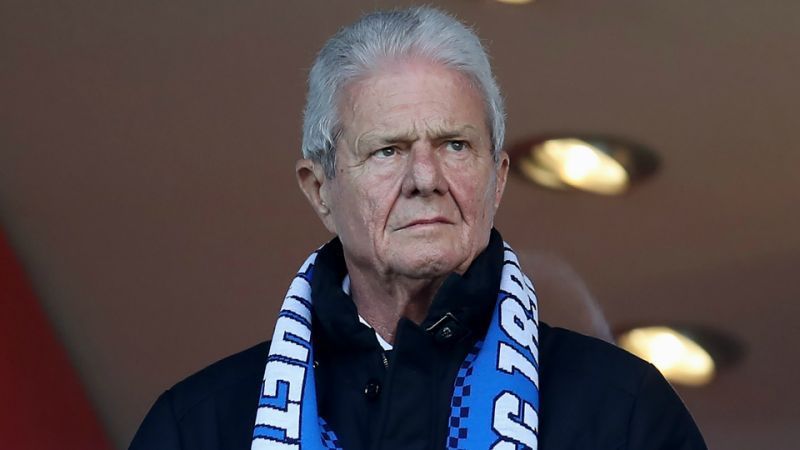
The software company SAP, co-founded by Hopp, is one of the sponsors of the German football federation, which has led to accusations of favourable treatment for Hopp by the officials concerning his ridiculous demands, which reached an absolute nadir back in 2010 when he requested that any criticism of himself and his club be "equated to racial discrimination and punished accordingly." There have, also, been several smaller incidents over the years, which the majority of German fans see as the DfB bending over backwards to keep a key investor of theirs happy.
Why the DFB needs to take a good, long, look at itself
The entire point of the 50+1 rule, as has been stated several times by the DFB itself, is to prevent the "Disneyfication" of the Bundesliga. In other words, it has been implemented to safeguard against the arrival of multibillionaires looking to make a quick buck on a club or turning it into a long-term cash cow, to serve their own financial interests.
This is a phenomenon that is all too familiar to fans of Premier League clubs such as Arsenal and Manchester United, who think their owners, the Glazer family and Stan Kroenke, use their clubs as money-making machines and run them as businesses, focusing on profits more than success on the pitch. In fact, within the Bundesliga itself, RB Leipzig has drawn criticism from all quarters with its circumventing of the 50+1 rule, but that is a rabbit hole for another time.
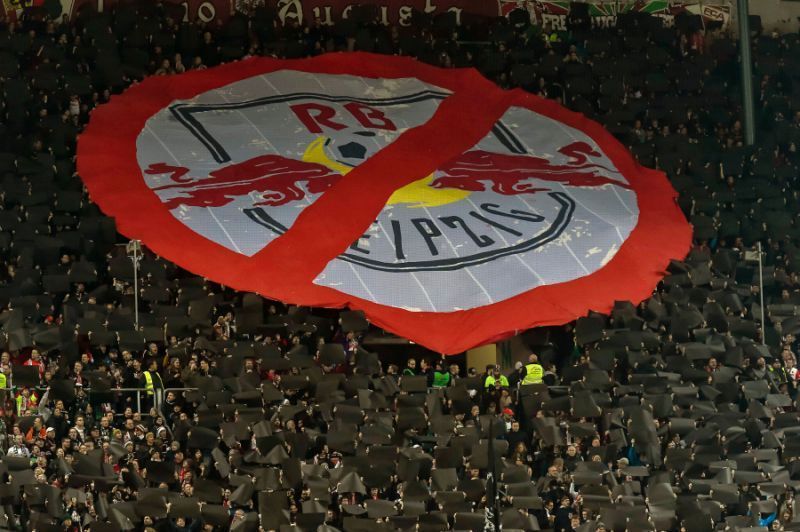
With the 50+1 ownership model, the idea is to make sure that most of the control is retained by the fans so that the club is allowed to grow organically and is supported mostly by ordinary people, who genuinely want the club to succeed on the pitch. However, with the DFB providing the 20-year investment exception to the rule, it is almost a case of locking the front door but leaving the back door wide open. If the federation is truly concerned with the well-being of the clubs and fans, it needs to crack down on this exception by either removing it or modifying it before it is too late.
Another major blunder committed by the DFB has been their overall response and handling of the situation. Following the halting of the game in Hoffenheim, it is clear that Bundesliga referees, at the very least, has been given the power to stop games if and when they see fit. Clearly, Christian Dingert interpreted the situation that way in the PreZero Arena and took the players off not just once or twice, but three times. In addition, Sunday's game between Union Berlin and VFL Wolfsburg saw more anti-Hopp banners unfurled, which led to the referee halting the game twice, before an announcement went around the stadium stating that failure to take down the offending banners would lead to the match being called off.
Sound familiar?
Now, here's a look at UEFA's THREE-step policy for tackling racist abuse detected in stadiums, which has also been adopted by the DFB;
1. Stop the match and instruct stadium authorities to read out an announcement, calling on spectators to stop.
2. If this announcement does not work, make another announcement, suspend the match and send the players to the dressing rooms for a specific period.
3. After consultation, abandon the match if the discriminatory behaviour still does not cease or breaks out again.
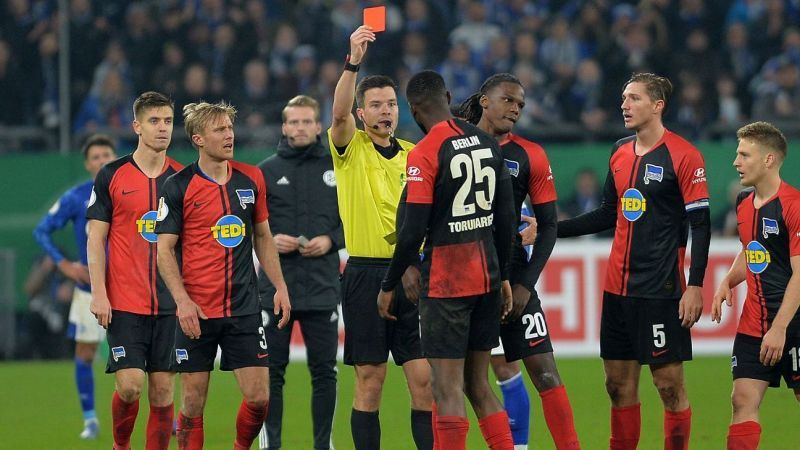
There is no question that so far, DFB officials have adhered strictly to this policy; with just one problem-this policy seems to vanish into thin air when racist abuse is reported. The most notable case in the Bundesliga so far has been the one of Hertha Berlin defender Jordan Torunarigha, who, in a cup game against Schalke, informed the referee of racist abuse he was receiving from the stands only to see the official listen to his and his teammates' complaints before continuing the game and even receiving a sending-off for an emotional response to further abuse.
It may have been laughable in 2010 when Hopp suggested that criticism of himself be considered tantamount to racism, but in 2020, it seems to be the sad reality of German football. While the language used in the banners is unparliamentary (to say the least) and they are in no way to be condoned, the response seems quite disproportionate, considering the stand that has been taken on what is undoubtedly a far more serious issue.
Germany's ultra culture and its potential extinction
The fan culture in Germany has always been a huge part of its footballing heritage. However, in recent years, with the authorities often imposing harsh restrictions on both home and away support, as well as reacting to (admittedly offensive) banners in such an extravagant fashion, much of the German public feels that this all part of a campaign to destroy the ultra culture and prevent fans from being outspoken, whether it be against specific clubs or the DFB.
There are several reasons this cannot be allowed to happen, several of which are listed here, via Felix Tamsut, a renowned journalist in Germany, who uses the example of a Bayern Munich fans' group called Schickeria (who were branded 'idiots' by Bayern executive Karl-Heinz Rummenigge on Saturday):
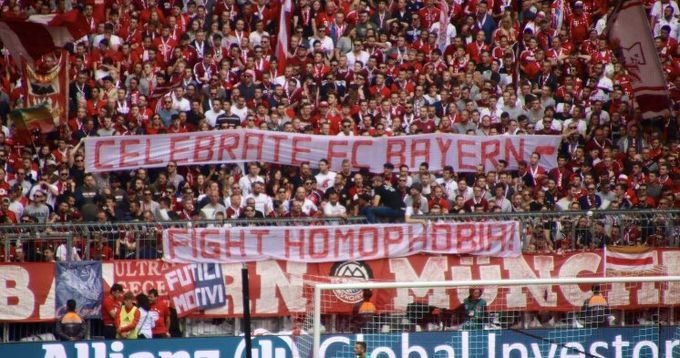
The Schickeria has been one of the most vocal fan groups advocating for refugee's rights across Germany, something quite admirable given Bavaria's shift towards right-wing politics in recent years and the increasing number of politicians who are extremely keen on the deportation of refugees, often claiming that Islam does not belong in Germany. The same fans group has also been extremely vocal in the fight against homophobia, xenophobia and racism as well as the cause they are most well-known for, which is Holocaust remembrance.
In essence, while things may seem rosy on the pitch, with Bundesliga teams making waves in Europe and the domestic title race shaping up to be one of the best in recent memory, German football is teetering on the edge of a precipice; and it is up to the authorities to decide whether it will land safely, or fall into the yawning chasm lurking beneath it.
After all, there's only so much the fans can do.